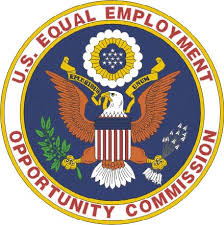Why am I being referred to the EEOC?

When people call us and ask if we can help them, the answer is rarely a simple “yes” or “no.” If the answer is a “no,” we like to always explain why. If the answer is a “yes,” we never immediately tell someone they have a case and instead schedule a meeting to go over the situation in more detail and decide the best cause of action. Often, the answer is neither “yes” nor “no” but something else entirely, such as requesting more information so we can make a decision or directing the caller to take certain action. Sometimes, after a call or after an in-person meeting, we recommend that people contact the Equal Employment Opportunity Commission, or EEOC. Why?
The United States Equal Employment Opportunity Commission, or EEOC, is a federal organization responsible for investigating and enforcing certain federal laws. The laws they handle deal with workplace discrimination based on race, color, religion, sex (including pregnancy), national origin, age (for 40 or older), disability, or genetic information. They also handle claims of retaliation, where an employee has complained about one of these types of discrimination and the employer took some kind of action against them because of that complaint. The EEOC investigates claims and sometimes pursues claims on behalf of employees. In addition to its Washington DC headquarters, the EEOC has 53 field offices throughout the country, including one in Detroit.
You can pursue a claim through the EEOC by yourself or with a lawyer. Whether you are better off being represented at the EEOC stage depends on many factors. Often, we sign people as clients and handle the EEOC process on their behalf. This allows us to communicate directly with the investigator and be as informed as possible about the progress of the charge. Sometimes we direct people to go to the EEOC themselves, either because we need the information the EEOC will gather before we can agree to represent someone or because we think the situation is better handled through the EEOC alone.
When the EEOC finishes its investigation of a claim, assuming there is not some sort of settlement or other resolution before the investigation ends, they usually issue a document called a “Right to Sue” letter. This document gives the employee the right to file a lawsuit in federal court. In many situations, we know that we have all the information we need and want to pursue a lawsuit, but still go to the EEOC first because we are required to “exhaust administrative remedies” (go through an EEOC investigation) before we are allowed to file a private lawsuit. Even when a case seems very strong, the EEOC process can be very helpful because it lets you know what the employer’s defense will be and often gives you additional information you would not normally have before filing a private suit.
When an employer has less than 15 employees (or 20 for an age claim), we may send an employee with a discrimination claim to the Michigan Department of Civil Rights, or MDCR. The MDCR is a Michigan state administrative agency that is similar to the EEOC with respect to the types of claims it handles. However, the MDCR can investigate claims that fall under state laws. Federal laws such as Title VII, the ADA, and the ADEA (for various types of discrimination) have minimum numbers of employees that employers must have in order to be covered. Some small employers are not covered by these laws but are still covered by equivalent Michigan laws. When this is the case, the MDCR can investigate claims that the EEOC cannot.
If you have a potential discrimination claim and want to know whether you should contact the EEOC, call Gold Star Law and we can help you make the decision.


